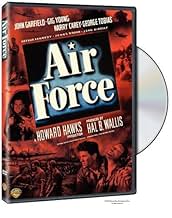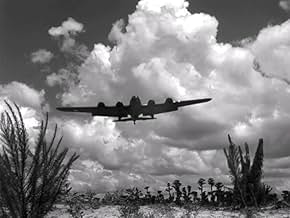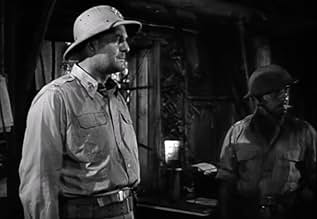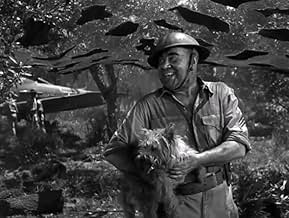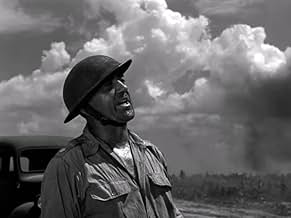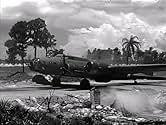Air Force
- 1943
- Tous publics
- 2h 4m
The crew of an Air Force bomber arrives in Pearl Harbor in the aftermath of the Japanese attack on December 7, 1941, and is sent on to Manila to help with the defense of the Philippines.The crew of an Air Force bomber arrives in Pearl Harbor in the aftermath of the Japanese attack on December 7, 1941, and is sent on to Manila to help with the defense of the Philippines.The crew of an Air Force bomber arrives in Pearl Harbor in the aftermath of the Japanese attack on December 7, 1941, and is sent on to Manila to help with the defense of the Philippines.
- Won 1 Oscar
- 3 wins & 3 nominations total
- Marine Sgt. J.J. Callahan
- (as Edward S. Brophy)
Featured reviews
Don't kid yourself that Hollywood no longer makes "propaganda" films. They are making them now more than ever. The films are just a different type of "propaganda".
This was a wartime movie made in a period where we had suffered lots of defeats and few victories. The young men being sent off to war had grown up being taught not to kill their fellow humans. Most of the early war 'propaganda' films went to lengths to 'dehumanize' the enemy so that a young American entering combat would not be conflicted. This happens in all wars but is more obvious to us today due to the amount of films made during WWII. Regarding the talk of 'fifth column' work at Pearl Harbor, I believe some have missed the point of the propaganda. We have become so aware of the race issue that we miss the point made in the film. It was not so much to single out the Japanese ancestry citizens of Hawaii as to make the American people think that it wasn't our military's fault that we were caught by surprise. The theme in that scene and later on Wake Island proffered that 'our boys don't lose in an even fight'. It was to establish confidence in our military and equipment. The idea was to tell the U.S. civilian population that we couldn't lose unless stabbed in the back. Actually, much of our equipment of the time was inferior to our opponents. We also had mostly 'green' troops whereas the Japanese had a lot of combat experienced pilots and troops. It was a tough fight all the way through and our veterans deserve full credit for winning.
This movie is entertaining and a great one for airplane/history buffs who know what is 'right' and what isn't correct. Politically it is dated and must be taken in context. It is still fun to watch and worth your time.
Did you know
- TriviaBecause of the constant noise in the planes, air crews wore "throat mics." These had two pickups that sat against the larynx (vocal cords) and picked the sound up directly from them. You will notice that whenever a crew member speaks he puts his hand up against the mic and presses it against his throat. This helped ensure good sound pickup.
- GoofsUnseen "snipers" attack the "Mary Ann" while at Maui. No Japanese "snipers" landed anywhere in the Hawaiian Islands during the attack.
- Quotes
Radio Operator Peterson: [looking down] That's an awful big town, San Francisco.
Assistant Crew Chief Weinberg: Strictly a one whistle stop. There's only one city in the U.S.A. and that's New York.
Sgt. Robbie White: Oh, you're just a hometown hick, Weinberg. What's wrong with California?
Assistant Crew Chief Weinberg: California? The sun shines and nuthin' ever happens. Before you know it, you're 60 years old.
Sgt. Robbie White: It's no different from New York. My sister's been tryin' to get out of Brooklyn for the last 40 years.
Assistant Crew Chief Weinberg: Brooklyn? That ain't New York, chief. Once you cross that Brooklyn Bridge, you're outta this woild. The only noise you hear is the hardening of your arteries. You know when I used to drive a hack, I had a pal who crossed that bridge in 1929. Ain't ever heard from him since.
Radio Operator Peterson: Me, I'll take Minneapolis.
Assistant Crew Chief Weinberg: Minneapolis? Why, the grass still grows in the streets. Besides, that ain't your hometown, Peterson. The hayseed's still stickin' outta your hair.
Radio Operator Peterson: Yeah, but I can still milk a cow. I bet you can't.
Assistant Crew Chief Weinberg: I'll get mine outta a bottle. That's the closest I ever wanna be to a cow.
Sgt. Robbie White: You are handy with the old bull.
Assistant Crew Chief Weinberg: [laughs]
- Crazy creditsOpening credits prologue: FOREWORD "It is for us the living .... to be dedicated here to the unfinished work which they who fought here have thus far so nobly advanced ..... It is ......for us to be here dedicated to the great task remaining before us ..... that this nation, under God, shall have a new birth of freedom and that government of the people, by the people, for the people, shall not perish from the earth." Abraham Lincoln
- ConnectionsEdited into Les orages de la guerre: Part IV (1988)
- SoundtracksThe Army Air Corps Song
(1939) (uncredited)
("Off We Go Into the Wild Blue Yonder")
Written by Robert Crawford
Played during the opening credits and often throughout the film
- How long is Air Force?Powered by Alexa
Details
- Release date
- Country of origin
- Official site
- Languages
- Also known as
- Los que supieron morir
- Filming locations
- Production company
- See more company credits at IMDbPro
Box office
- Budget
- $2,646,000 (estimated)
- Runtime
- 2h 4m(124 min)
- Color
- Aspect ratio
- 1.37 : 1


